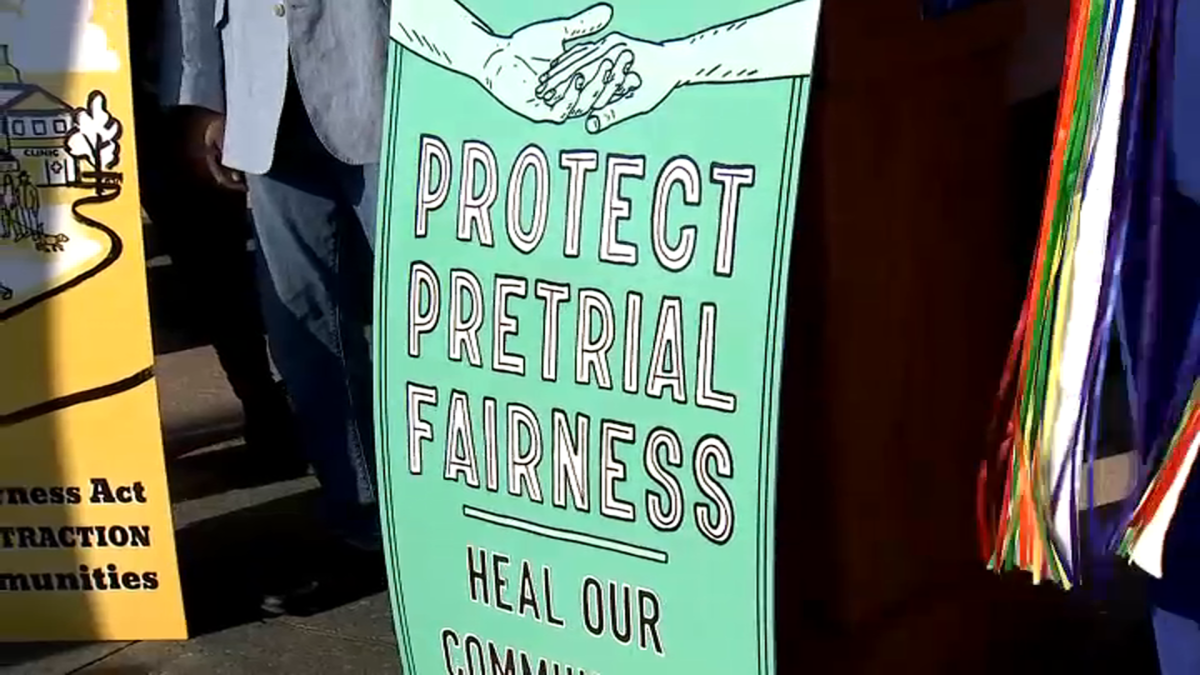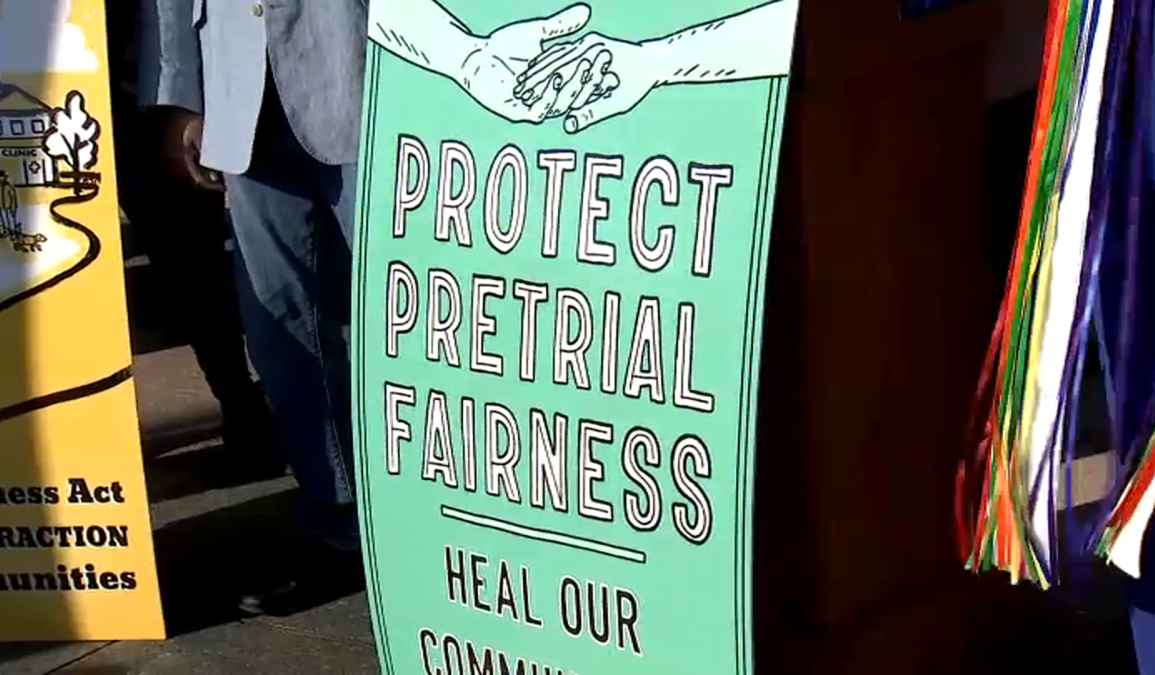
Illinois on Monday became the first state in the nation to implement cashless bail, but how will the elimination of cash bail work in the state?
Following months of legal debate, the “Pretrial Fairness Act” took effect in all of Illinois’ 102 counties. The Illinois Supreme Court upheld the pretrial fairness portion of the state’s controversial SAFE-T Act in a 5-2 ruling in mid-July, allowing the end of cash bail to proceed.
“Today, Illinois is no longer criminalizing poverty, and the entire nation has their eyes on us,” Illinois House Speaker Emmanuel “Chris” Welch said during a press conference Monday. “Unfortunately, we’ve heard a lot of falsehoods about this historic law. We heard a whole lot of racist dog whistles too. And we’re still hearing them. But let’s be clear: the Pretrial Fairness Act makes Illinois a national leader in criminal justice reform, and we are making our communities safer. Anyone who suggests criminals will automatically be released from jail, or print fake newspapers about the ‘purge’ law – ladies and gentlemen, they’re being disingenuous.”
Here’s a look at what this means and what residents can expect:
What is bail and what does the new law change?
According to the American Bar Association, “bail is the amount of money defendants must post to be released from custody until their trial.”
The money is aimed at ensuring that person appears for their trial and is returned to them once the trial is over.
Illinois’ Pretrial Fairness Act abolishes cash bail as a condition of pretrial release, however.
Judges can still keep people accused of serious crimes behind bars pretrial, but first would have to go through a more rigorous review of each case.
What will cashless bail look like in Illinois?
Although setting people free before trial will become the default in Illinois, there will still be cases that warrant detention, including for those accused of violent or sexual offenses or facing charges involving a gun, according to Cook County Public Defender Sharone Mitchell Jr.
In such cases, the judge must weigh several factors in deciding whether to keep someone jailed, including evidence, previous convictions, and whether that person is a flight risk.
According to Lake County State’s Attorney Eric Rinehart, his office will “file petitions to detain offenders who are arrested after Sept. 18, 2023.”
“Judges will decide whether someone is detained or not detained awaiting trial. If a judge rules for detention, those individuals arrested after the effective date will no longer be able to access cash to gain release,” Rinehart stated.
According to the Cook County Public Defender’s office, “as they do already in Cook County, people accused of many misdemeanors will be released from police custody and given a court date in the future.”
Those accused of “more significant offenses,” however, will appear in court within 48 hours for their initial appearance.
“If the prosecutor petitions for pretrial detention, the court will hold a detention hearing within 24-48 hours. If, at the Detention Hearing, the prosecutor will present evidence that the accused person is a potential threat to community safety or a flight risk,” the office said in a release. “The defense attorney can contest this evidence. Based on the evidence presented at the detention hearing, the judge will decide whether to order the accused person detained or released pending the outcome of their case. The judge may order conditions of pretrial release, such as electronic monitoring or curfew. If a person is denied release at the initial hearing, they will have future hearings to contest whether they must continue to be jailed pending trial.”
Detention hearings would not be not mandatory for crimes that include probation as a possible punishment, but judges can still make the determination to keep those defendants incarcerated pending trial if they determine they are a risk to the public.
“Please be patient as the state rolls this out, okay?” State Rep. Justin Slaughter said. “Some things to look for – first, there is a transition period. Those who are in the old system will be given an opportunity to either stay in that old system or bring their situation into the new system, pay attention to that.”
Which crimes are included?
So-called “forcible felonies” include first and second-degree murder, predatory criminal sexual assault, robbery, burglary, residential burglary, aggravated arson, kidnapping, aggravated battery resulting in great bodily harm, or any other felony that involves the use or threat of physical violence.
Hate crimes, attempts of crimes that are detainable, animal torture and DUI causing great bodily harm were added to the list in a subsequent amendment to the legislation.
“We still have a detention net that is very clear, judges have discretion within that detention net,” Illinois State Sen. Robert Peters, who filed the amended bill, said. “But again, the intent and the core parts of this legislation remain intact.”
“Your lower level of nonviolent offenses are not going to be eligible for detention. But those higher level offenses will be indeed eligible for detention,” Slaughter said.
In Cook County, Board President Toni Preckwinkle said stakeholders at all levels are prepared to implement the “Pretrial Fairness Act” on Monday.
“As a result of nearly two years of thoughtful and collaborative preparation, Cook County is ready to implement the new procedures required by the Pretrial Fairness Act,” she said. “As our court system transitions to the new procedures, my administration will continue to provide resources and support to ensure our continued success.”
Why is Illinois doing this?
Critics say cash bail policies are especially unfair to Black people and other people of color. A 2022 federal civil rights report on cash bail systems found that courts tend to impose higher pretrial detention penalties on Black and Latino people, citing a study that showed Black men received bail amounts 35% higher than white men, and Latino men received bail amounts 19% higher than white men.
Cook County Public Defender Sharone Mitchell Jr. described Illinois’ previous cash bail system as “a cousin to slavery.”
“The vast majority of people in the system are poor, and they’re Black and brown, and they have no power. It is an incredibly unfair system,” he said. “You go to a bond hearing, it sounds like a slave auction. People are talking very fast. They’re putting price tags on people’s freedom.”
Between 1970 and 2015, there was a fivefold increase in the number of people jailed before trials, according to the 2022 U.S. Commission on Civil Rights report. Data shows more than 60% of defendants were detained prior to trial because they couldn’t afford to post bail, and that nearly 74% of the 631,000 people jailed daily in the United States are awaiting trial.
Typically in state courts, a judge decides if a defendant poses too much of a threat to the community to be released, or if they can be freed with conditions, according to the nonprofit Bail Project.
Some states have tried to ease cash bail rules.
In 2017, New Jersey essentially replaced its cash bail system with a risk assessment process that gauged the potential danger a released defendant could pose to the community. But cash bail is still allowed in some instances in that state and others that have curtailed the practice, such as New York and Alaska.
California has made several efforts to reform its cash bail system, but lawmakers balked at sweeping reform.
Proponents of cash bail argue that it ensures released defendants show up for court proceedings, and say that without it, violent criminals who are released pending trial could have the opportunity to commit more crimes. But New Jersey data showed that after the state moved away from cash bail, the number of defendants who were charged with a new crime or who failed to appear in court remained steady.
Illinois state Senate minority leader John Curran, a Republican representing suburbs southwest of Chicago, said he’s not opposed to changing the system but wants judges to retain more power than Illinois’ new law grants.
“I’ve always said that New Jersey has done this mostly right,” Curran said. “All felonies are put before a judge and a judge can consider if a person is a danger to the community or a willful flight risk or whether there is a history of intimidating witnesses, and they can detain on those standards and it gives judges full discretion.”
The loudest opposition to the change in Illinois has come from law enforcement. Jim Kaitschuk, executive director of the Illinois Sheriffs’ Association, said members’ focus is now on trying to “work through it the best we can.”
“I think we’ll be searching for a lot of people” because defendants who don’t post bond have no incentive to return to court, Kaitschuk said.
This post was originally published on this site be sure to check out more of their content.







